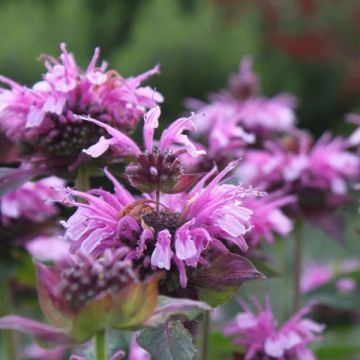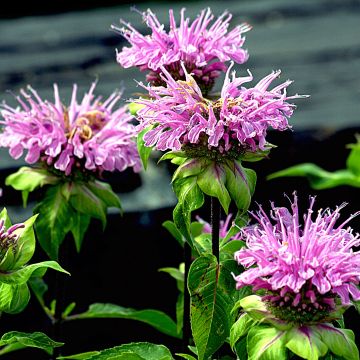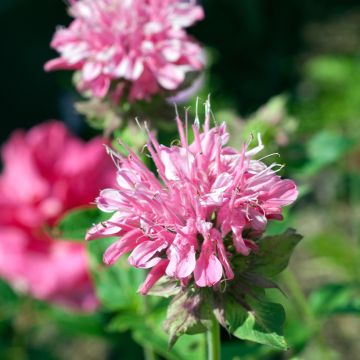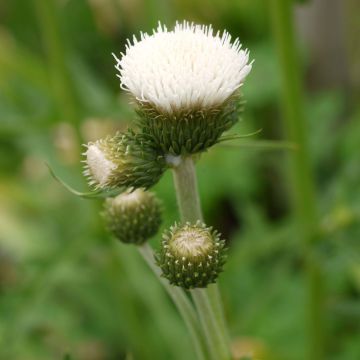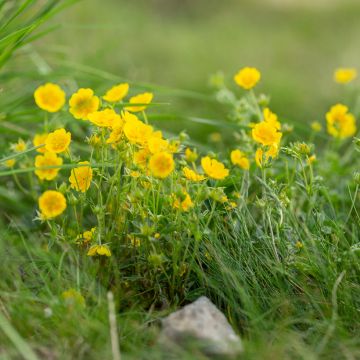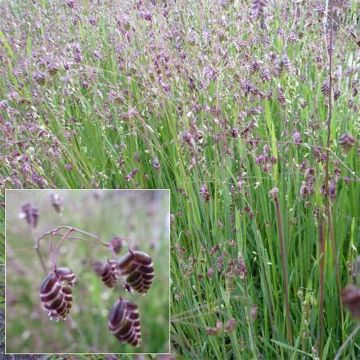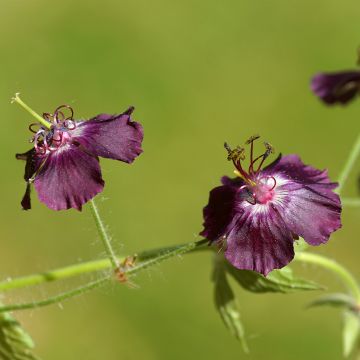

Monarda 'Cambridge Scarlet', 'Scorpion', M. fistulosa menthifolia, 'Schneewittchen'
Monarda 'Cambridge Scarlet', 'Scorpion', M. fistulosa menthifolia, 'Schneewittchen'
Monarda Cambridge Scarlet, Scorpion, M fistulosa menthifolia, Schneewittchen
This plant carries a 12 months recovery warranty
More information
We guarantee the quality of our plants for a full growing cycle, and will replace at our expense any plant that fails to recover under normal climatic and planting conditions.
From €5.90 for pickup delivery and €6.90 for home delivery
Express home delivery from €8.90.
Does this plant fit my garden?
Set up your Plantfit profile →
Collection items (4 plants)
Description
The collection consists of:
- x 1 Monarda 'Cambridge Scarlet' : a variety reaching a height of 90cm (35in), highly appreciated for the brightness of its intense red flowers. Its ruffled inflorescences are composed of bracts in a dark pinkish purple colour. Flowering from July to September, or even until October.
- x 1 Monarda 'Scorpion': a variety reaching a height of 90cm (35in), with wine-coloured pink flowers surmounting bracts marbled with violet brown, just coloured enough. Flowering from July to October.
- x 1 Monarda fistulosa var. menthifolia: Wild bergamot reaching a height of 50cm (20in). It flowers from August to September, for 7 to 8 weeks. Its bright mauve flowers surmount bracts tinged with purple. Its foliage has mint aromas. This shorter variety should be planted in front of the others, at the edge of the flower bed.
- x 1 Monarda 'Schneewittchen': one of the rare varieties with white flowers, of great beauty, with pure white flowers grouped around green bracts. The plant reaches a height of 80cm (32in).
Monardas, also known as Oswego Tea for their use in infusions, belong to the family of Lamiaceae. They flower from a young age, above foliage that smells more or less like bergamot. They are tall and floriferous perennials, but they are also greedy. They spread quickly in fertile soil, preferably slightly damp, in a sunny or slightly shaded location. Leave a spacing of 40cm (16in) between plants so that each one can flourish. This corresponds to 4 to 5 plants per square metre.
Plant the monardas in groups of 4 to 6 plants to obtain a beautiful mass of flowers. You can also interplant them among other tall perennials with summer flowering and vibrant or pastel colours. The colour palette is vast with daylilies, with which Monardas form beautiful combinations, especially in large borders. For a more rustic look, choose other tall plants such as 'Asran' aster, 'Blue Pouffe' or 'White Pouffe' bellflowers, Nepeta kubanica or Agastache anisata, for example.
You can make tea with the leaves or flowers of Monardas, whether fresh or dried. You can also use the young shoots in salads or in the stuffing of a roast.
Report an error about the product description
Flowering
Foliage
Plant habit
Botanical data
Monarda
Cambridge Scarlet, Scorpion, M fistulosa menthifolia, Schneewittchen
Lamiaceae
Cultivar or hybrid
Other Monarda - Bee Balm
Planting and care
These Monardas need a moist, but well-drained and humus-rich or compost-rich soil. They don't tolerate root competition very well. After planting, mulch the base of the Monardas with a layer of dead leaves, flax flakes, cocoa bark, straw, anything that can maintain soil moisture. Winter moisture is also a threat to Monardas, which is why drainage should be taken care of during planting. In summer, if drought sets in, water the plants regularly. In autumn, cut back the withered stems to ground level. In slightly poor soils, spread well-decomposed compost on the stumps.
Planting period
Intended location
Care
This item has not been reviewed yet - be the first to leave a review about it.
Summer flowering perennials
Haven't found what you were looking for?
Hardiness is the lowest winter temperature a plant can endure without suffering serious damage or even dying. However, hardiness is affected by location (a sheltered area, such as a patio), protection (winter cover) and soil type (hardiness is improved by well-drained soil).

Photo Sharing Terms & Conditions
In order to encourage gardeners to interact and share their experiences, Promesse de fleurs offers various media enabling content to be uploaded onto its Site - in particular via the ‘Photo sharing’ module.
The User agrees to refrain from:
- Posting any content that is illegal, prejudicial, insulting, racist, inciteful to hatred, revisionist, contrary to public decency, that infringes on privacy or on the privacy rights of third parties, in particular the publicity rights of persons and goods, intellectual property rights, or the right to privacy.
- Submitting content on behalf of a third party;
- Impersonate the identity of a third party and/or publish any personal information about a third party;
In general, the User undertakes to refrain from any unethical behaviour.
All Content (in particular text, comments, files, images, photos, videos, creative works, etc.), which may be subject to property or intellectual property rights, image or other private rights, shall remain the property of the User, subject to the limited rights granted by the terms of the licence granted by Promesse de fleurs as stated below. Users are at liberty to publish or not to publish such Content on the Site, notably via the ‘Photo Sharing’ facility, and accept that this Content shall be made public and freely accessible, notably on the Internet.
Users further acknowledge, undertake to have ,and guarantee that they hold all necessary rights and permissions to publish such material on the Site, in particular with regard to the legislation in force pertaining to any privacy, property, intellectual property, image, or contractual rights, or rights of any other nature. By publishing such Content on the Site, Users acknowledge accepting full liability as publishers of the Content within the meaning of the law, and grant Promesse de fleurs, free of charge, an inclusive, worldwide licence for the said Content for the entire duration of its publication, including all reproduction, representation, up/downloading, displaying, performing, transmission, and storage rights.
Users also grant permission for their name to be linked to the Content and accept that this link may not always be made available.
By engaging in posting material, Users consent to their Content becoming automatically accessible on the Internet, in particular on other sites and/or blogs and/or web pages of the Promesse de fleurs site, including in particular social pages and the Promesse de fleurs catalogue.
Users may secure the removal of entrusted content free of charge by issuing a simple request via our contact form.
The flowering period indicated on our website applies to countries and regions located in USDA zone 8 (France, the United Kingdom, Ireland, the Netherlands, etc.)
It will vary according to where you live:
- In zones 9 to 10 (Italy, Spain, Greece, etc.), flowering will occur about 2 to 4 weeks earlier.
- In zones 6 to 7 (Germany, Poland, Slovenia, and lower mountainous regions), flowering will be delayed by 2 to 3 weeks.
- In zone 5 (Central Europe, Scandinavia), blooming will be delayed by 3 to 5 weeks.
In temperate climates, pruning of spring-flowering shrubs (forsythia, spireas, etc.) should be done just after flowering.
Pruning of summer-flowering shrubs (Indian Lilac, Perovskia, etc.) can be done in winter or spring.
In cold regions as well as with frost-sensitive plants, avoid pruning too early when severe frosts may still occur.
The planting period indicated on our website applies to countries and regions located in USDA zone 8 (France, United Kingdom, Ireland, Netherlands).
It will vary according to where you live:
- In Mediterranean zones (Marseille, Madrid, Milan, etc.), autumn and winter are the best planting periods.
- In continental zones (Strasbourg, Munich, Vienna, etc.), delay planting by 2 to 3 weeks in spring and bring it forward by 2 to 4 weeks in autumn.
- In mountainous regions (the Alps, Pyrenees, Carpathians, etc.), it is best to plant in late spring (May-June) or late summer (August-September).
The harvesting period indicated on our website applies to countries and regions in USDA zone 8 (France, England, Ireland, the Netherlands).
In colder areas (Scandinavia, Poland, Austria...) fruit and vegetable harvests are likely to be delayed by 3-4 weeks.
In warmer areas (Italy, Spain, Greece, etc.), harvesting will probably take place earlier, depending on weather conditions.
The sowing periods indicated on our website apply to countries and regions within USDA Zone 8 (France, UK, Ireland, Netherlands).
In colder areas (Scandinavia, Poland, Austria...), delay any outdoor sowing by 3-4 weeks, or sow under glass.
In warmer climes (Italy, Spain, Greece, etc.), bring outdoor sowing forward by a few weeks.








































